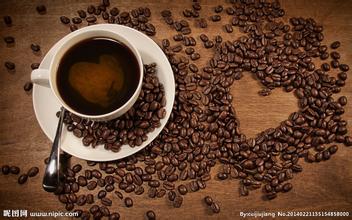World Coffee Bean Certification What is Organic Coffee Bean? How to properly certify organic coffee beans?
Organic coffee is coffee that does not use synthetic pesticides, herbicides or chemical fertilizers during its growth. These ways of growing coffee are conducive to maintaining a healthy environment and keeping the groundwater pure. After the coffee is harvested, be sure to use an organically certified roaster to process the coffee beans. Organic coffee is made of beans grown in the shade of trees.
Although the yield of the method of planting in the shade is not high, its quality can reach the level of gourmet coffee. This is because shading trees can slow down the ripening of coffee trees, give coffee full growth, and make it contain more natural ingredients, better taste and less caffeine.
Organic coffee does not use any insecticides or other chemicals to treat diseases and insect pests or cultivation problems, but uses natural methods, such as natural composting, hedgerow, pruning, etc., to maintain the growth of coffee trees. Use all-natural biological control methods in pest control, such as planting protective trees, and using a variety of other natural farming techniques to ensure the health of coffee trees. Because the sustainability of land, water and the natural ecological environment is an active concern of the organic coffee industry. Organic high-quality coffee is a masterpiece of heaven, earth, and man-weather, soil, and love. It takes five years for a coffee tree to blossom and bear fruit. A pound of coffee needs about 4000 coffee beans, which are harvested manually. Each coffee tree harvests only enough coffee fruit a year to produce a pound of roasted beans, which is rare.
Frequently asked questions and answers on organic coffee
What is organic coffee?
See a lot of organic coffee on the Internet? What is organic coffee?
What exactly is organic coffee? is organic coffee enema useful? Is the organic coffee on Taobao real? Can I buy it? Help!?
What is organic coffee?
Popular point: coffee that does not apply pesticides, chemical fertilizers and no pollution.
There are usually two situations:
One is: consciously grow organic coffee. Coffee cultivation in order to grow organic coffee artificially, and to obtain organic coffee certification to prove the quality of coffee, the ultimate goal is to sell a good price, a clear commercial purpose.
The second is organic coffee grown unconsciously. In other words, pure organic coffee, which depends on heaven to speak, allows coffee trees to grow freely and is unattended. This kind of coffee has a sweet skin and is often eaten by birds. The spider weaves a web in the tree.
Does organic coffee enema work?
Professionals think that the effect of organic coffee enema is obvious. For details, you can inquire about the relevant introduction.
Is the organic coffee on Taobao real?
The organic coffee on Taobao should be treated carefully. However, there are still some rules to follow, such as prices, we all know that crops with chemical fertilizers have high yields, while organic coffee is a crop that does not apply fertilizer, although the yield will not be very high, especially for coffee trees planted unconsciously. there won't be a lot of coffee. So the price of organic coffee is at least three times or more than that of regular roasted coffee. What is too cheap must be a fake.
Can I buy organic coffee on Taobao?
Online shopping is a consumption trend, there are fake goods, there will be real goods. Mainly rely on consumers to see for themselves, more comparison. Be sure to consume rationally. You can see a lot of things by yourself. For example, many of those with good reputation are fired, and these businesses can often deceive people with this. This is reflected in the immaturity of many Chinese consumers, who like to follow the trend of consumption, and buy them when they see what is well written in the evaluation. I don't know if I'm familiar with it. these may all be "trusts". Ha ha, the above personal opinions are for reference only! I hope it will help you!
What is organic coffee? what's the difference between organic coffee and regular coffee?
Organic ∶ has life. Relating to or derived from an organism. It now refers to those containing carbon atoms, except carbon monoxide, carbon dioxide, carbonic acid, carbonates and certain carbon compounds.
Its compound refers to the compound composed of carbon element and hydrogen, oxygen, nitrogen or sulfur. It's called organic matter for short.
The decomposed substances such as the remains and feces of plants and animals are transformed into humus by microorganisms and contain all kinds of nutrients needed for plant growth. It's called organic matter.
Organic vegetable ∶ is a vegetable grown completely without pesticides or chemical fertilizers. It is cultivated by natural prevention and control of diseases and insect pests and organic fertilizer, so there is no pesticide residue.
Organic fertilizer ∶ animal excreta, decomposition of animal and plant carcasses, or organic waste from food processing plants can be used for breeding and fertilization.
The term "organic" covers the production management system of crops and the product itself.
The production management of organic crops refers to the technology and specification of its production surface, which is called "Organic farming method (Organic Farming)".
The products managed and cultivated according to this standard can be called "organic products (Organic Products)".
For example, ∶ organic fruits, organic rice, organic vegetables, … , etc. And the "organic processed food" produced after the processing process.
Such as ∶ organic soybean milk, organic fruit juices, organic tea, organic coffee, … , etc.
The relevant definitions of organic agriculture in various countries are detailed as follows: ∶
1. Dr Rudolf Steiner, a German scholar of ∶ in Europe, advocated organic agriculture in 1924. In addition to setting up nine associations of organic agriculture among the people, he set up its own standards and labels to promote organic agriculture.
two。 ∶ Organic Agriculture in the United States was first regulated in the 1940s as follows: ∶
(1) the United States Department of Agriculture and the Federal Drug and Food Administration conduct regular spot checks.
(2) soil and Fertilizer ∶ it is stipulated that chemically synthesized fertilizers and agriculture should never be used on crops.
(3) pest control ∶ approves the use of natural pesticides or biological control of insects.
(4) for edible animals, ∶ should not be injected with drugs such as hormones, artificial growth promoters, and antibiotics to increase production.
3. Mr. Worthinton, a British agronomist at ∶, defined eco-agriculture ∶ in 1981 as "small-scale agriculture that is ecologically self-sustaining and economically viable, and ethically acceptable." In other words, reducing the application of chemical compounds to reduce its impact on natural ecology, and Japanese scholars also believe that ecological agriculture is the general name of organic agriculture, natural agriculture and light pesticide agriculture.
4. Mr. Yoshimo Okada, ∶ of Japan, proposed the natural farming method in 1935. He advocated not using chemical synthetic substances, chemical fertilizers, pesticides, and other chemical substances, but using natural organic matter to cultivate soil. He believed that only healthy soil could produce healthy crops. At the same time, the principle of balance was used to control diseases and insect pests. In 1953, it extended its concept to the whole country, and 27 other countries, including Taiwan. 1992 the guidelines for the labelling of Organic Agricultural products and specially cultivated Agricultural products shall be formulated in the Department of Agriculture and Forestry of Japan.
5. The key points for the verification and guidance of ∶ organic agricultural products in Taiwan are defined as follows: ∶ "refers to the agricultural products produced by the organic agricultural products benchmark established by the Association in full compliance with the soil and water sources of the same agricultural land that are not contaminated. According to the all-organic cultivation mode, the producer is called the all-organic product; according to the quasi-organic cultivation mode, the producer is called the quasi-organic agricultural product.

Source: kafeidou.org
Important Notice :
前街咖啡 FrontStreet Coffee has moved to new addredd:
FrontStreet Coffee Address: 315,Donghua East Road,GuangZhou
Tel:020 38364473
- Prev

World Coffee Bean Certification Tropical Rain Forest Alliance Certification Coffee Frog beans detailed introduction
Rainforest Alliance certified coffee frog beans Rainforest Alliance certification rainforest certification logo has an obvious frog, Rainforest Alliance certified coffee, also known as frog beans. Rainforest Alliance RA (Rainforest Alliance) certification refers to a farm that meets the standards set by the Rainforest Alliance, and the Alliance will conduct research on the farm and its surrounding ecosystems.
- Next

World Coffee Bean Certification what is carbon-neutral coffee? How to correctly certify carbon-neutral coffee beans?
What is carbon neutral coffee? For the origin of carbon neutralization, the New Oxford English Dictionary announced that the annual vocabulary for 2006 is "carbon neutral", which means "carbon neutralization". Carbon neutralization, also known as carbon compensation (Carbon Offset), is one of the efforts made by modern people to slow global warming. Carbon-neutral coffee is carbon-neutral coffee certified by the carbon-neutral organization.
Related
- How did the Salvadoran coffee industry develop in Central America?
- What exactly does the golden cup extraction of coffee mean?
- The Origin of Coffee flower
- [2023 Starbucks World Earth Day] there are more meaningful things besides free Starbucks coffee!
- What kind of coffee is there in Spain? 9 Flavors of Spanish Coffee
- Aromatic African coffee| Kenya's coffee culture and historical production area
- Liberica Coffee Bean knowledge: the characteristics of Liberian Coffee beans of the three original species of Coffee beans
- The origin and formula of Spanish latte introduces the taste characteristics of Bombon coffee in Valencia, Spain.
- How to adjust the solution of over-extracted coffee
- What is the tasting period of coffee beans? What is the period of coffee and beans? How should coffee wake up and raise beans?

